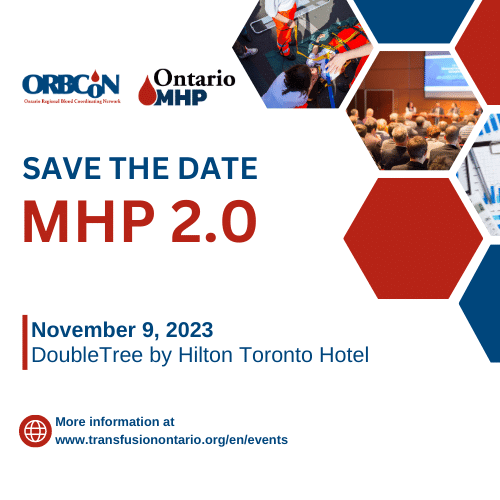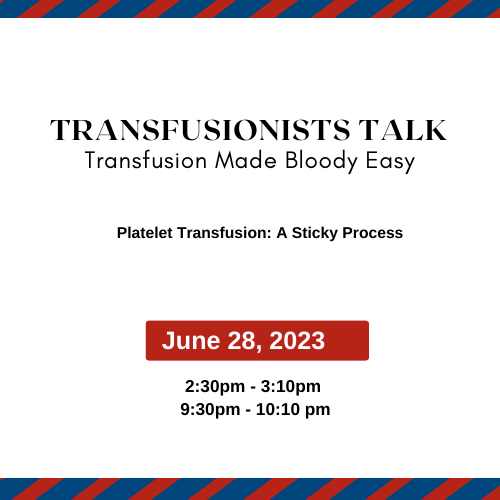The Specialist in Transfusion Science Program
Dr. Gwen Clarke
Specialist in Transfusion Science Lead & Clinical Professor, Department of Laboratory Medicine and Pathology University of Alberta Hematopathologist, Island Health Victoria BC
and
Dr. Jelena Holovati
Associate Professor and Director, Graduate Studies
Department of Laboratory Medicine and Pathology
Laboratory Director, Stem Cell Manufacturing
Canadian Blood Services
The Specialist in Transfusion Science (STS) program is a new training program, currently in development, which will offer advanced training for medical technologists. Intended for those with work experience in transfusion medicine, this program will allow individuals to develop and demonstrate an area of advanced competency in transfusion.
The idea for this program was born at the 2015 CSTM annual meeting in Winnipeg. At that national venue during the lecture delivered by Bob Fallis upon his acceptance of the Buchanan Award, Bob spoke of the need for an opportunity for technologists working in transfusion medicine to develop advanced knowledge and skills in transfusion science and leadership, and to be afforded a means of demonstrating those advanced competencies through a certification process.
This idea was subsequently championed by the board of directors of the CSTM, and in 2020 an education subcommittee was tasked with the initial planning for such a program.The group included Technologists, Scientists, Educators and Physicians from locations across Canada and with work experience in large and small transfusion services, blood suppliers, industry, and quality systems. *
The group began by developing a needs assessment survey that was distributed across Canada. Ninety-two surveys were sent to transfusion medicine leaders at hospital transfusion services and blood suppliers. Surveys were completed by 60% of recipients (53/92) and confirmed there was a need for training and recognition of specialists in transfusion science to fill leadership positions in transfusion laboratories across the country. Further, the survey indicated that many sites would be willing to serve as training venues for experiential learning associated with such a program. Survey respondents indicated that advanced competencies in technical, managerial and clinical skills were important.
Concomitantly with the needs assessment the STS committee undertook a review of similar programs around the world. The content of the Specialist in Blood Banking program from the United States was reviewed along with advanced training courses from the United Kingdom and Australia. While content and ideas from other programs were helpful, it was clear that a made in Canada approach to training was needed when the results of the needs assessment were compared with the available international programs.
The next steps, led by the educators and quality specialists on the committee, involved development of a series of competencies. These competencies were based on a quality systems framework and were designed to demonstrate what program graduates would be able to do and the skills they would have, upon completion of the training program. Using an iterative and consensus based process, 56 competencies were established as the foundation for the training program. These competencies will be maintained by the subject matter experts at CSTM STS subcommittee and will be regularly reviewed and updated. The competencies will also form the basis for a portfolio of materials that will be used to assess candidates for certification as specialists in transfusion science.
The competencies developed by the committee were each accompanied by a broad recommendation around how that competency could be assessed, and the learning activities that might lead to achievement of the competency. The competencies were grouped into categories leading to the development of 6 courses that will form the first part of a 1 – 2 year course of study.
Following the STS committee’s work in development of the competencies and courses the torch was passed to the University of Alberta Department of Laboratory Medicine and Pathology as the educational partner in the development of this training program. Supported by Alberta Precision Laboratories and Canadian Blood Services as additional training partners, the STS program is planned as a laddered, 1 – 2 year approach to advanced training of medical technologists allowing for a certificate of competency after the first year and an MSc degree after the second. In future, similar programs for advanced training in other fields of medical technology are envisioned. Other educational institutions may also choose to develop a similar course of study based on the established competency framework.
Candidate admission to the STS program may include those with an MLT and BSc, those with an MLT (diploma), and those with international credentials. All will require a formal pre admission evaluation of skills and experience as well as academic equivalency assessment. Prospective candidates will require substantial work experience in transfusion as a prerequisite to admission.
Once enrolled, trainees will undertake one year of course based study (6 courses with 3 credits each) including topics in immunohematology, immunohematology techniques, clinical transfusion support, blood supply management, laboratory management and quality systems. A second year, for eligible candidates, will include a 6 credit capping project, elective courses and experiential learning/observerships in relevant laboratory settings.
Successful completion of the first year of the program will lead to a certificate of specialization in transfusion science. Completion of the second year will lead to a Masters of Science degree in Laboratory Medicine and Pathology.
Work is ongoing to establish University and funding agreements for the program and to develop detailed curriculum plans for the courses. This curriculum will be reviewed by experts in the transfusion community prior to implementation. Discussions are also underway to determine the optimal pathway for credentialing and licensing of this and other similar advanced training programs. It is hoped that the first candidates will be accepted for entry into the program in 2024.
*The STS Subcommittee membership can be found here: https://www.transfusion.ca/Members/Committees/Specialization-in-Transfusion-Science-Committee/Administration-and-General
Provincial Survey: MHP Repeat survey was disseminated to all Ontario hospitals with a transfusion medicine laboratory. We have asked all sites to please submit a response by May 26, 2023. Have you submitted yours yet?
Social Media: Our Simulation #1 Trauma Massive Hemorrhage Protocol video has crossed 1M views! Thank you so much to all of our viewers who have helped us achieve this incredible milestone. But we’re not done yet and we’d love for you to join us on our journey.
So, be sure to check out and share our new Patient Pamphlet Video and help us reach our next big goal of 1M views!
Newsboard
ORBCoN Fall Symposium: Save the Date

CSTM 2023

Save the Date
Transfusionists Talk: Transfusion Made Bloody Easy

UofT TM Rounds

June 22, 2023 @12pm-1pm
Cultural Perspective of Blood Transfusion in Indigenous Communities by Ms. Krista Maracle
Subscribe to UofT Transfusion Medicine Rounds mailing list to get register